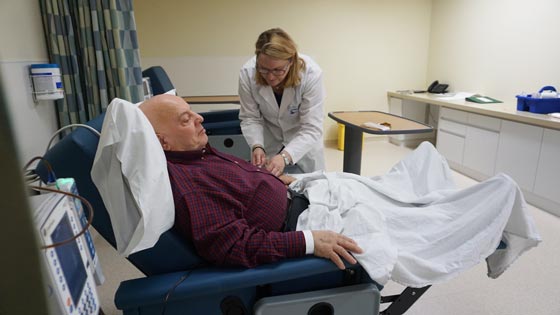
Suzanne Hemeon, RN Coordinator, Ambulatory Cardiac Clinics, provides care to 77-year-old Carlos Gaspar, a congestive heart failure patient, inside the newly-opened Richard A.G. Robinson Heart Function Day Unit at the Peter Munk Cardiac Centre. (Photo: UHN)
Tucked away at one end of the long hallway in the fifth floor Ambulatory Cardiac Clinics area of the Peter Munk Cardiac Centre (PMCC), a bright new space is now open. And Carlos Gaspar, along with Registered Nurse Suzanne Hemeon, is the first to occupy it.
Gaspar had aortic valve surgery at PMCC in January 2016 and while recovering at a rehabilitation centre, contracted a virus that left him with Congestive Heart Failure. As a result, he requires regular treatment, which is where the room fills a void.
"The treatment room is for short-term out-patient therapy, interventions and infusions," says Suzanne. "These are treatments which could take up to three or four hours and do not require continuous monitoring."
Large, airy space
Among the treatments patients will receive in the large, airy space: intravenous Lasix, iron infusions, first dose antibiotics for patients going home on homecare, dressing changes, intravenous (IV) fluid replacement for dehydrated patients, blood transfusions, and IV medication administration.
Hemeon has been in the newly-created RN coordinator position in the Ambulatory Cardiac Clinic for 18 months. She describes her role as having three main facets – "Nursing knowledge, skills, and judgment to aid patients and coordinate care, improve the patient experience and provide supportive, patient-centered care in an ambulatory setting."
Benefits for both patients and staff
The Richard A. G. Robinson Heart Function Day Unit was made possible through philanthropy via the Ted Rogers Centre for Heart Research, and is seen as beneficial for both patients and staff a variety of reasons, including:
- Appointments can be scheduled to coincide with clinic visits if needed
- Appointments can be ordered upon assessment of the patient (in the moment) to manage symptoms
- Patients remain ambulatory in the clinic for monitoring and further decision-making
- Instills confidence in the patient and decreases wait time
Perhaps the single greatest impact of the heart function day unit comes in preventing unnecessary emergency room visits and admissions.
Since the day unit first began operating at PMCC in February 2015, in another location:
135 patients had their care expedited
60 patients were not sent to ER
25 patients visits did not have to be done in the medical day unit
Also, 60 patients were not admitted for IV infusion, which saved hours of waiting in the emergency department and the inpatient unit, both of which were part of the previous process.
It's estimated the treatment room concept has yielded cost-savings of about $30,000 for UHN.
